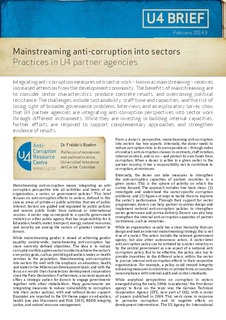| dc.contributor.author | Boehm, Frédéric | |
| dc.date.accessioned | 2018-01-04T08:18:18Z | |
| dc.date.available | 2018-01-04T08:18:18Z | |
| dc.date.issued | 2014-02-11 | |
| dc.identifier | oai:www.cmi.no:5048 | |
| dc.identifier.citation | Bergen: Chr. Michelsen Institute (U4 Brief 2014:3) 4 p. | |
| dc.identifier.uri | http://hdl.handle.net/11250/2474856 | |
| dc.description.abstract | Integrating anti-corruption measures into sector work – known as mainstreaming – receives increased attention from the development community. The benefits of mainstreaming are to consider sector characteristics, produce concrete results, and overcoming political resistance. The challenges include sustainability, staff time and capacities, and the risk of losing sight of broader governance problems. Interviews and an exploritary survey show that U4 partner agencies are integrating anti-corruption perspectives into sector work through different instruments. While they are investing in building internal capacities, further efforts are required to support complementary approaches and strengthen evidence of results. | |
| dc.language.iso | eng | |
| dc.publisher | Chr. Michelsen Institute | |
| dc.relation | U4 Brief | |
| dc.relation | 2014:3 | |
| dc.relation.ispartof | U4 Brief | |
| dc.relation.ispartofseries | U4 Brief 2014:3 | |
| dc.relation.uri | https://www.cmi.no/publications/5048-mainstreaming-anti-corruption-into-sectors | |
| dc.title | Mainstreaming anti-corruption into sectors: Practices in U4 partner agencies | |
| dc.type | Report | |
